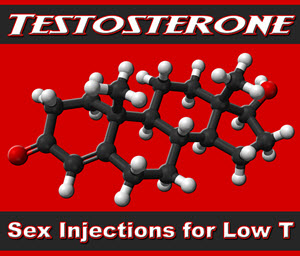Introduction
Depo Testosterone, a brand name for testosterone cypionate, is a widely used injectable form of testosterone replacement therapy (TRT) manufactured by Pfizer. It is primarily prescribed to treat conditions associated with low testosterone levels in men, such as hypogonadism. However, its impact on hematological disorders in American males warrants a closer examination, given the potential implications for patient health and treatment outcomes.
Understanding Depo Testosterone
Depo Testosterone is administered via intramuscular injection, typically on a biweekly or monthly basis, depending on the patient's needs and the prescribing physician's recommendations. The primary goal of this therapy is to restore testosterone levels to a normal range, thereby alleviating symptoms such as fatigue, decreased libido, and muscle loss. As with any medication, understanding its broader effects on the body, including hematological parameters, is crucial.
Impact on Hematological Parameters
One of the notable effects of testosterone therapy, including Depo Testosterone, is its influence on red blood cell production. Testosterone stimulates erythropoiesis, the process by which red blood cells are produced in the bone marrow. This can lead to an increase in hematocrit and hemoglobin levels, which are essential for oxygen transport in the blood. While this can be beneficial for patients with anemia, it also poses a risk of developing polycythemia, a condition characterized by an abnormally high concentration of red blood cells.
Polycythemia and Its Risks
Polycythemia is a significant concern for men on testosterone therapy. Elevated hematocrit levels can increase blood viscosity, potentially leading to cardiovascular events such as strokes and heart attacks. Regular monitoring of hematocrit levels is recommended for patients on Depo Testosterone to mitigate these risks. If polycythemia develops, adjustments to the dosage or frequency of injections may be necessary, or alternative treatments might be considered.
Clinical Studies and Observations
Several clinical studies have investigated the hematological effects of testosterone therapy. A study published in the Journal of Clinical Endocrinology & Metabolism found that testosterone therapy significantly increased hematocrit levels in hypogonadal men. Another study in the American Journal of Hematology highlighted the need for vigilant monitoring of hematological parameters in patients receiving TRT, emphasizing the potential for polycythemia.
Pfizer's Role and Recommendations
Pfizer, the manufacturer of Depo Testosterone, provides guidelines for the safe use of this medication. They recommend regular blood tests to monitor hematocrit levels and advise healthcare providers to consider the potential for polycythemia when prescribing Depo Testosterone. Pfizer also emphasizes the importance of individualized treatment plans, taking into account each patient's medical history and current health status.
Patient Education and Management
Educating patients about the potential hematological effects of Depo Testosterone is crucial. Men should be informed about the signs and symptoms of polycythemia, such as headaches, dizziness, and shortness of breath, and encouraged to report any concerns to their healthcare provider promptly. Additionally, lifestyle modifications, such as maintaining a healthy weight and staying hydrated, can help manage the risk of polycythemia.
Conclusion
Depo Testosterone by Pfizer plays a vital role in managing low testosterone levels in American males. However, its impact on hematological disorders, particularly the risk of polycythemia, necessitates careful monitoring and management. By understanding these effects and adhering to recommended guidelines, healthcare providers can help ensure the safe and effective use of Depo Testosterone, ultimately improving patient outcomes and quality of life.
Contact Us Today For A Free Consultation

- Depo Testosterone: Enhancing Sexual Health in American Men with Low Testosterone [Last Updated On: March 17th, 2025] [Originally Added On: March 17th, 2025]
- Depo Testosterone: Impacts on Weight Management in American Males with Low Testosterone [Last Updated On: March 17th, 2025] [Originally Added On: March 17th, 2025]
- Depo Testosterone: Psychological Impacts on Mood, Cognition, and Self-Esteem in Men [Last Updated On: March 19th, 2025] [Originally Added On: March 19th, 2025]
- Depo Testosterone: Enhancing American Men's Health and Vitality [Last Updated On: March 19th, 2025] [Originally Added On: March 19th, 2025]
- American Men's Experiences with Depo Testosterone Therapy: Benefits and Challenges [Last Updated On: March 20th, 2025] [Originally Added On: March 20th, 2025]
- Depo Testosterone: Enhancing Energy and Vitality in Men with Hypogonadism [Last Updated On: March 20th, 2025] [Originally Added On: March 20th, 2025]
- Depo Testosterone: Enhancing Athletic Performance and Associated Risks in American Male Athletes [Last Updated On: March 21st, 2025] [Originally Added On: March 21st, 2025]
- Depo Testosterone: Enhancing Life for American Males with Hypogonadism [Last Updated On: March 21st, 2025] [Originally Added On: March 21st, 2025]
- Depo Testosterone: Impacts on Prostate Health and Cancer Risk in American Men [Last Updated On: March 21st, 2025] [Originally Added On: March 21st, 2025]
- Depo Testosterone: Benefits, Risks, and Management for Low Testosterone Treatment [Last Updated On: March 22nd, 2025] [Originally Added On: March 22nd, 2025]
- Depo Testosterone: Vital for Men's Health, Challenges in Accessibility and Solutions [Last Updated On: March 22nd, 2025] [Originally Added On: March 22nd, 2025]
- Depo Testosterone: Efficacy and Safety in American Males with Hypogonadism [Last Updated On: March 22nd, 2025] [Originally Added On: March 22nd, 2025]
- Navigating Insurance Coverage for Depo Testosterone: A Guide for American Men [Last Updated On: March 22nd, 2025] [Originally Added On: March 22nd, 2025]
- Depo Testosterone: Benefits and Considerations for Transgender American Males' HRT [Last Updated On: March 22nd, 2025] [Originally Added On: March 22nd, 2025]
- Depo Testosterone: Treating Delayed Puberty in American Males Effectively [Last Updated On: March 22nd, 2025] [Originally Added On: March 22nd, 2025]
- Depo Testosterone: Benefits and Skin Health Effects in American Men [Last Updated On: March 22nd, 2025] [Originally Added On: March 22nd, 2025]
- Depo Testosterone Therapy: Future Trends and Impact on American Male Health [Last Updated On: March 23rd, 2025] [Originally Added On: March 23rd, 2025]
- Depo Testosterone: Enhancing Libido and Sexual Function in American Men with Hypogonadism [Last Updated On: March 23rd, 2025] [Originally Added On: March 23rd, 2025]
- Depo Testosterone: A Promising Treatment for ED in American Men with Low Testosterone [Last Updated On: March 23rd, 2025] [Originally Added On: March 23rd, 2025]
- Depo Testosterone: Effects on Blood Sugar Levels in American Males [Last Updated On: March 24th, 2025] [Originally Added On: March 24th, 2025]
- Depo Testosterone: Benefits vs. Cardiovascular Risks for American Men [Last Updated On: March 24th, 2025] [Originally Added On: March 24th, 2025]
- Depo Testosterone: Monitoring, Dosage Adjustment, and Safety for American Males [Last Updated On: March 24th, 2025] [Originally Added On: March 24th, 2025]
- Depo-Testosterone's Impact on Sleep Quality in American Men: Insights and Management [Last Updated On: March 24th, 2025] [Originally Added On: March 24th, 2025]
- Depo Testosterone: Benefits and Risks for Older American Men's Health [Last Updated On: March 24th, 2025] [Originally Added On: March 24th, 2025]
- Depo Testosterone: Enhancing Life for American Male Cancer Survivors [Last Updated On: March 24th, 2025] [Originally Added On: March 24th, 2025]
- Depo Testosterone: Managing Chronic Conditions in American Men [Last Updated On: March 24th, 2025] [Originally Added On: March 24th, 2025]
- Depo Testosterone: Enhancing American Male Body Composition and Health [Last Updated On: March 24th, 2025] [Originally Added On: March 24th, 2025]
- Depo Testosterone: Enhancing Stress Management in American Males with Low Testosterone [Last Updated On: March 24th, 2025] [Originally Added On: March 24th, 2025]
- Depo Testosterone: Vital Therapy for Hypogonadism in American Male Adolescents [Last Updated On: March 25th, 2025] [Originally Added On: March 25th, 2025]
- Depo Testosterone: Enhancing Life Quality in American Male Veterans [Last Updated On: March 25th, 2025] [Originally Added On: March 25th, 2025]
- Depo Testosterone: Enhancing Endurance in American Male Athletes - Benefits and Risks [Last Updated On: March 25th, 2025] [Originally Added On: March 25th, 2025]
- Depo Testosterone and Hair Loss: Risks, Management, and Psychological Impact [Last Updated On: March 25th, 2025] [Originally Added On: March 25th, 2025]
- Depo Testosterone Pfizer: Enhancing Mood and Well-being in American Males with Hypogonadism [Last Updated On: March 25th, 2025] [Originally Added On: March 25th, 2025]
- Depo Testosterone's Impact on Digestive Health in American Males: Effects and Considerations [Last Updated On: March 25th, 2025] [Originally Added On: March 25th, 2025]
- Depo Testosterone's Impact on Immune System: Insights for American Males [Last Updated On: March 26th, 2025] [Originally Added On: March 26th, 2025]
- Depo Testosterone: Enhancing Cognitive Function in American Males with TRT [Last Updated On: March 26th, 2025] [Originally Added On: March 26th, 2025]
- Depo Testosterone: A Promising Adjunct in Diabetes Management for American Males [Last Updated On: March 26th, 2025] [Originally Added On: March 26th, 2025]
- Depo Testosterone: Balancing Hormone Therapy and Fertility in American Males [Last Updated On: March 27th, 2025] [Originally Added On: March 27th, 2025]
- Depo Testosterone: Benefits for Hypogonadism and Potential Eye Health Risks in American Males [Last Updated On: March 27th, 2025] [Originally Added On: March 27th, 2025]
- Depo Testosterone: Enhancing Life Quality for American Males with HIV/AIDS [Last Updated On: March 27th, 2025] [Originally Added On: March 27th, 2025]
- Depo Testosterone: Benefits, Liver Risks, and Monitoring for American Men [Last Updated On: March 27th, 2025] [Originally Added On: March 27th, 2025]
- Depo Testosterone's Impact on Joint Health in American Males: Risks and Benefits [Last Updated On: March 27th, 2025] [Originally Added On: March 27th, 2025]
- Depo Testosterone: Enhancing Fertility in American Males with Low Testosterone [Last Updated On: March 27th, 2025] [Originally Added On: March 27th, 2025]
- Depo Testosterone: Pfizer's Injectable HRT for American Males with Low Testosterone [Last Updated On: March 27th, 2025] [Originally Added On: March 27th, 2025]
- Depo Testosterone: Benefits and Risks for American Male Weightlifters [Last Updated On: March 27th, 2025] [Originally Added On: March 27th, 2025]
- Depo Testosterone: Treating Anemia in American Men with Pfizer's Injectable Solution [Last Updated On: March 28th, 2025] [Originally Added On: March 28th, 2025]
- Depo Testosterone: Effects on Kidney Function and Monitoring in American Males [Last Updated On: March 28th, 2025] [Originally Added On: March 28th, 2025]
- Depo Testosterone: Treating Chronic Fatigue Syndrome in American Males [Last Updated On: March 28th, 2025] [Originally Added On: March 28th, 2025]
- Depo Testosterone's Role in Managing Osteoporosis in American Males: A Comprehensive Overview [Last Updated On: March 28th, 2025] [Originally Added On: March 28th, 2025]
- Depo Testosterone's Impact on Respiratory Health in American Males: A Comprehensive Review [Last Updated On: March 29th, 2025] [Originally Added On: March 29th, 2025]
- Depo Testosterone: A Promising Treatment for Depression in American Males with Low Testosterone [Last Updated On: March 29th, 2025] [Originally Added On: March 29th, 2025]
- Depo Testosterone's Impact on Ear Health in American Males: A Comprehensive Review [Last Updated On: April 2nd, 2025] [Originally Added On: April 2nd, 2025]
- Depo Testosterone: A Potential Treatment for Anxiety in American Males with Low Testosterone [Last Updated On: April 2nd, 2025] [Originally Added On: April 2nd, 2025]
- Depo Testosterone's Impact on Dental Health in American Males: A Comprehensive Analysis [Last Updated On: April 2nd, 2025] [Originally Added On: April 2nd, 2025]
- Depo Testosterone: Managing Thyroid Disorders in American Males [Last Updated On: April 3rd, 2025] [Originally Added On: April 3rd, 2025]
- Depo Testosterone: Managing Autoimmune Diseases in American Males [Last Updated On: April 7th, 2025] [Originally Added On: April 7th, 2025]
- Depo Testosterone: A Promising Solution for Migraine Management in American Males [Last Updated On: April 7th, 2025] [Originally Added On: April 7th, 2025]
- Depo Testosterone's Impact on Skin Health in American Males: Benefits and Side Effects [Last Updated On: April 8th, 2025] [Originally Added On: April 8th, 2025]
- Depo Testosterone: Uses, Allergic Reactions, and Management for American Males [Last Updated On: April 8th, 2025] [Originally Added On: April 8th, 2025]
- Depo Testosterone: A Promising Treatment for Insomnia in American Males [Last Updated On: April 8th, 2025] [Originally Added On: April 8th, 2025]
- Depo Testosterone: A Promising Option for Chronic Pain Management in American Males [Last Updated On: April 9th, 2025] [Originally Added On: April 9th, 2025]
- Depo Testosterone: Benefits for Neurological Disorders in American Males [Last Updated On: April 9th, 2025] [Originally Added On: April 9th, 2025]
- Depo Testosterone: Impacts on Cardiovascular Health in American Males [Last Updated On: April 10th, 2025] [Originally Added On: April 10th, 2025]
- Depo Testosterone's Impact on Gastrointestinal Health in American Males [Last Updated On: April 10th, 2025] [Originally Added On: April 10th, 2025]
- Depo Testosterone: Understanding TRT for Hypogonadism in American Males [Last Updated On: April 10th, 2025] [Originally Added On: April 10th, 2025]
- Depo Testosterone: Enhancing Respiratory Health in Hypogonadal American Males [Last Updated On: April 11th, 2025] [Originally Added On: April 11th, 2025]
- Depo Testosterone: Enhancing Arthritis Management in American Males [Last Updated On: April 13th, 2025] [Originally Added On: April 13th, 2025]
- Depo Testosterone: Effects, Risks, and Management in Male Reproductive Health [Last Updated On: April 15th, 2025] [Originally Added On: April 15th, 2025]
- Depo Testosterone's Impact on Psychiatric Disorders in American Males: A Comprehensive Review [Last Updated On: April 16th, 2025] [Originally Added On: April 16th, 2025]
- Depo Testosterone: Benefits and Considerations for American Males with Genetic Disorders [Last Updated On: April 17th, 2025] [Originally Added On: April 17th, 2025]
- Depo Testosterone: Managing Musculoskeletal Disorders in American Males [Last Updated On: April 17th, 2025] [Originally Added On: April 17th, 2025]
- Depo Testosterone: Potential Dermatological Uses and Considerations in American Males [Last Updated On: April 18th, 2025] [Originally Added On: April 18th, 2025]
- Depo Testosterone: Enhancing Metabolic Health in American Males with Pfizer's Therapy [Last Updated On: April 18th, 2025] [Originally Added On: April 18th, 2025]
- Depo Testosterone: Enhancing Life for American Males with Renal Disorders [Last Updated On: April 18th, 2025] [Originally Added On: April 18th, 2025]
- Depo-Testosterone's Impact on Urological Disorders in American Males: Benefits and Risks [Last Updated On: April 18th, 2025] [Originally Added On: April 18th, 2025]
- Depo Testosterone: A Promising Treatment for Inflammatory Diseases in American Males [Last Updated On: April 18th, 2025] [Originally Added On: April 18th, 2025]
- Depo Testosterone's Role in Managing Infectious Diseases in American Males [Last Updated On: April 21st, 2025] [Originally Added On: April 21st, 2025]
- Depo Testosterone Enhances Body Composition and Muscle Mass in Hypogonadal Men: Clinical Trial [Last Updated On: April 22nd, 2025] [Originally Added On: April 22nd, 2025]
- Depo Testosterone: Effective Hypogonadism Treatment for American Males [Last Updated On: April 23rd, 2025] [Originally Added On: April 23rd, 2025]
- Depo Testosterone: Effects on Cancer Risks in American Males [Last Updated On: April 23rd, 2025] [Originally Added On: April 23rd, 2025]
Word Count: 540




















